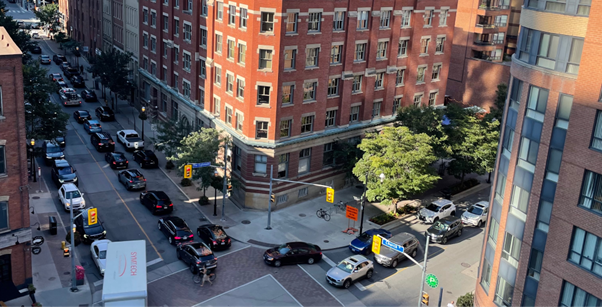By Laura Hull –
Our city, particularly downtown, has a constant hum of cars, people, animals, motorcycles and construction, among other things. The constant everyday noise, and noise spikes, have significant impacts on people’s health. But the city could do better.
Ingrid Buday, founder of No More Noise Toronto, a campaign to create community support before the city reviews the noise bylaw later this year, has become quite knowledgeable about noise pollution in Toronto. She said the most common sources of loud noises, according to 311 Toronto, are amplified music, construction and vehicles.
Harvey Watson manages the Air and Noise group at Burnside, a company that assesses noise quality for municipalities, including the City of Toronto. In daytime, the default noise level for Burnside’s assessments is 50 decibels, he said, and at night it’s 45 decibels.
However, a 2016 study by Toronto Public Health called “How Loud is Too Loud” found that noise levels in Toronto were higher. Buday said noise has increased since the 2016 study, especially after Covid-19 receded.
“When the cars were off the roads, we suddenly heard people talking, we heard birds, we slept better,” she said. “There was a collective sigh, and the earth moved less.”
Since then, many people can feel the effects of more noise. A quick social media call-out from the bridge regarding noise got many responses. Everyone had a story about noise disturbing their lives.
Many people living near major intersections or close to the Don Valley Parkway or the Gardiner Expressway wrote that they are bothered by non-stop traffic. Others wrote of modified vehicles whose drivers like to show off by loudly racing on residential streets.
Buday listed many potential side effects, emphasizing annoyance, sleep disturbance, and hearing loss. Annoyance may not seem like a major problem, but it can lead to hopelessness, and combined with sleep deprivation, can increase anxiety and depression.
“Our bodies are constantly listening, so the constant annoyance also causes the body to release stress hormones, thickening the arteries, which can lead to heart disease, strokes, diabetes, hypertension, among other things,” Buday said.
“Health impacts can start at a really young age,” she added. Children trying to learn get distracted by noise, reducing their ability to think and hindering the learning process.
Toronto has by-laws to reduce the impact of noise, and suggests that residents report excessive noise to the city’s information gateway (call 311 or email 311@toronto.ca). But according to Watson, Buday and Alexandre Piccini, an acoustic engineer, these measures aren’t effective, especially regarding vehicles.
The pass-by test for road vehicle certification assesses if a vehicle works properly: “you can hear it subtly, but it’s not disturbing you,” Piccini explained. “As long as everybody is complying with the rules, there wouldn’t be any problems.” However, people don’t always obey the law.
Abnormally loud vehicles often have “minimalistic and uncertified aftermarket parts, or a damaged system,” Piccini said. Inspection loopholes make law enforcement harder.
“In practice, it seems that there aren’t enough resources to handle all the complaints the city has, and so priority seems to go to recurring complaints,” said Piccini.
Buday agreed, saying the enforcement process is flawed. Stopping vehicles over noise “has to be done by two departments, the police and the by-law officers, which makes it slow,” she said. “Plus, the process to report to 311 is flawed.”
“Toronto police themselves said that doing noise enforcement blitzes is not worth the time, so right there is police endorsement that the by-laws need to be stronger,” she added.
How can you protect yourself from noise pollution? Many on social media suggested noise-cancelling headphones, or creating artificial white noise to help with sleep. Watson said building contractors should “put in better windows or better walls that reduce the amount of noise that goes through.”
Buday urged concerned people to sign up for city updates about the by-law review and stay informed.
“People need to show up to public meetings, have people tell their story and voice their concerns,” she added. “When it comes time for the bylaw review in November, people should depute, they should send in emails to City Council, they should speak their mind and speak loudly about noise.”





2 Comments
Thank You Laura for your insightful article regarding the noise levels in this city. I agree, this city is very noisy. I recently visited Paris and London. Cities, 10x the size, over 20 million people each.
Quiet! How is this possible I thought.
No helicopters flying overhead 15 hrs per day. No vehicles beeping while reversing, and they have road construction and delivery vehicles, no one seems to die because there vehicles don’t beep. No car alarms. No car honking, maybe the odd “toot” . No loud music. No loud motor bikes, speeding cars in the city. No drug addicts having 3 hr. screaming meltdowns. They have homelessness, they just didn’t seem as crazy.
With an emergency here, we hear 3 fire trucks, 5 police cars then an ambulance or 2. The alarms are so loud that if they start them while going down the street and you are on the side walk, you will jump out of your skin and have to plug your ears from the pain. There, 1 ambulance, perhaps a police car, the level of the sound quite acceptable.
All the mitigations you mention in the article are important but it comes down to each person in society understanding and doing there part to make the city livable.
I will be signing up for city updates regarding by-law reviews.
The review process is now. Sept 13-21, 2023
Register here https://www.eventbrite.com/cc/implementation-review-of-noise-bylaw-2516039
6 different meeting reviewing each kind of noise. Some meetings virtual, some in person.